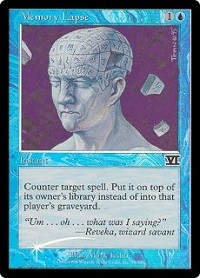 First off, this will kick off the new year with the first full strategy article, with many more to come in the following weeks. I am still working on the
website so the articles will likely come slowly at first, but they will certainly be in depth. My new years resolution is to keep producing content for
the website at least once a week throughout the year. I will also adding a Card of the Day feature, hopefully by the end of the day, though it may take until
the weekend. I hope everyone had a great New Years and has a great year to come. Enjoy!
First off, this will kick off the new year with the first full strategy article, with many more to come in the following weeks. I am still working on the
website so the articles will likely come slowly at first, but they will certainly be in depth. My new years resolution is to keep producing content for
the website at least once a week throughout the year. I will also adding a Card of the Day feature, hopefully by the end of the day, though it may take until
the weekend. I hope everyone had a great New Years and has a great year to come. Enjoy!
This is something that I wanted to take a deep in depth look into for a very long while. Remand has shown to be a very powerful card in modern and yet a card that somewhat similar in fuction, Memory Lapse, is not played in pauper at all. I help examine each card in different situations and examine what is at the core of each card that make them similar, yet very different at the same time. Remand is not legal in Pauper, but this article is here to draw the similarities and differences that they have. I will go over specific examples and also drill down to the core fundamentals of the cards and differences they have with hard counterspells.
It is easy to see that the two cards have the same mana cost, which is only one of the reasons to warrant comparrison. I could easily compare two cards without similar mana cost and in due time I will. Several other cards have the same mana cost so we could address them as well. How about Prohibit? Prohibit counters a spell and is the same mana cost so it fills the same role does it not? Memory Lapse and Remand both do not get rid of the threat but simply delay it. Prohibit sends the threat to the graveyard, if it is counterable by Prohibit that is. So prohibit in that instance is better because it removes the threat, with a few exceptions of decks with recursion. Prohibit also has a converted mana cost restriction of what it can counter, where as Remand and Memory Lapse do not, which makes Prohibit quite differently. In certain situations one card can be better than others, yet in other situations the other card can be better. You have to decide based on the metagame and what decks you beleive you will face.
How are they similar and different?
So what does Memory Lapse and Remand have in common and how are they different? They both aim to delay your opponents threat, setting their plan back. This is very different from removing a threat because it is not removed. Against a deck that only has only a few powerful threats that you need to be concerned about, a hard counter is much stronger, with the exclusion of a few decks with recursion. The difference between delaying an opponent, and removing a threat are very different based on the matchup. Each one has their advantages, and disadvantages.
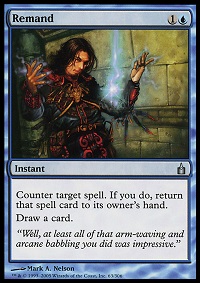 Both of these counters are tempo counters. They are there just to delay your opponent, costing them extra time and mana so that you can push your advantage.
Say I cast a delver turn 1, turn 1 my opponent casts nothing. Turn 2, delver flips to a tempo counter and my opponent tries to cast a relevant spell
turn 2. I cast the tempo counter setting him back. My delver still gets to attack but he is punished by the tempo hit he just took. That example is
usually represented more in an aggro tempo deck which I will write an article about in the future. Tempo can also be used as a method to try to
catch up and regain footing in a control deck. MBC for example runs chittering rats, which does a very similar function as Memory Lapse and Remand. It
slows down your opponent while either your plan is currently in progress, or if it is still setting up. I will also eventually write an article about
tempo in control as well. Either way, the threat isn't removed as in the case of a hard counter, but simply averted.
Both of these counters are tempo counters. They are there just to delay your opponent, costing them extra time and mana so that you can push your advantage.
Say I cast a delver turn 1, turn 1 my opponent casts nothing. Turn 2, delver flips to a tempo counter and my opponent tries to cast a relevant spell
turn 2. I cast the tempo counter setting him back. My delver still gets to attack but he is punished by the tempo hit he just took. That example is
usually represented more in an aggro tempo deck which I will write an article about in the future. Tempo can also be used as a method to try to
catch up and regain footing in a control deck. MBC for example runs chittering rats, which does a very similar function as Memory Lapse and Remand. It
slows down your opponent while either your plan is currently in progress, or if it is still setting up. I will also eventually write an article about
tempo in control as well. Either way, the threat isn't removed as in the case of a hard counter, but simply averted.
Now what is the key difference between the two. Memory Lapse puts the card on top and Remand draws a card. Depending on the situation, it can make a big difference. An opponent with two mountains untapped while you are at 3 life casts Lightning Bolt. If you counter it with Remand, he can still cast it. If you don't have enough mana to counter it again with another spell or don't have another spell, you are toast. If you counter it with Memory Lapse, your opponent may not have a free way to draw a card, and it can set them a whole turn back. That is very powerful indeed, though depending on your deck, the Remand could draw you into your own spell that will seal the victory for you. So the choice to play one over the other depends on your deck and the matchup. There is always a chance your opponent doesn't need a Memory Lapsed spell, and could just shuffle it away.
A very close look between them removal wise is that they equal out card advantage wise with a 1:1 trade at the core. On that turn with remand, you replaced your spell, and denied your opponent with tempo. With Memory Lapse, you set them back a draw, at the cost of the card, however after your draw step and their draw step you will be back at the parody that you would be with casting Remand.
Some Examples of hard counters vs Memory Lapse and Remand
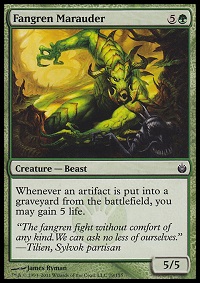 Let us take the most popular classic Tron build for example, RUG Tron. Against certain decks, the only thing that they fear from tron is Fangren Marauder. That
card alone can send the game into a very long game which is where the Tron player wants to be at against most decks. A hard counter can cripple the Tron
players chances, though these days they are often running a couple copies of Haunted Fengraf for recursion but not near the level of recursion say Tortured
Existence decks have. Removing that one threat could infact make a very big difference in the game. Putting the threat back into the Tron players hand
however, could mean that the Tron player could just recast it if they have the extra mana. Remand does allow you to draw a card, which could get
another remand or another useful card to deal with the situation. At least a hard counter in this situation makes them sacrifice a Haunted Fengraf
to return it. Prohibit can't target it due to the mana cost. Memory Lapse would put the Fangren Marauder back on top of the library. Tron is typically
built with many Chromatic Stars and Chromatic Spheres. With any of these in play, they can simply use one to draw the Marauder back and then play it.
Let us take the most popular classic Tron build for example, RUG Tron. Against certain decks, the only thing that they fear from tron is Fangren Marauder. That
card alone can send the game into a very long game which is where the Tron player wants to be at against most decks. A hard counter can cripple the Tron
players chances, though these days they are often running a couple copies of Haunted Fengraf for recursion but not near the level of recursion say Tortured
Existence decks have. Removing that one threat could infact make a very big difference in the game. Putting the threat back into the Tron players hand
however, could mean that the Tron player could just recast it if they have the extra mana. Remand does allow you to draw a card, which could get
another remand or another useful card to deal with the situation. At least a hard counter in this situation makes them sacrifice a Haunted Fengraf
to return it. Prohibit can't target it due to the mana cost. Memory Lapse would put the Fangren Marauder back on top of the library. Tron is typically
built with many Chromatic Stars and Chromatic Spheres. With any of these in play, they can simply use one to draw the Marauder back and then play it.
With this circumstance, it does gain the Tron player less life, due to having to use the star or sphere to get the Fangren Marauder back that turn and cast it, however it doesn't deal with the issue to much of an advantageous way. With a hard counter, the popular way to retrieve it would be Fengraf. With remand, the Tron player could just have enough mana to cast it again. However you did get to draw a card that can hopefully deal with the issue. With Memory Lapse the tron player has to sacrifice some of the life gain he could have gotten, if the Tron player wishes to try to cast it again that turn. It does still put them a card behind you with all three of these situations. However the hard counter leaving it only to Fengraf is the most powerful option. Depending on your deck, remand or memory lapse may be more powerful but it comes down to some of the life you were trying to avoid, or drawing a card. The only effect in Pauper where drawing a card could be more beneficial that comes to my mind that is played is Jace's Erasure. Though still on the fringe, it is played in a deck and the card draw could help you mill the opponent out. However if you did put it on top of the opponents library and had another card with a draw spell, it could mill the fangreen and getting rid of it. I am not saying memory lapse is optimal in a turbo fog deck with Jace's Erasure, but merely saying that is the only case in which the draw may make the difference outside the normal context of just drawing a card. Depending on the board state either drawing a card or avoiding the lifegain could be better, as it may be the only Chromatic Star or Chromatic Sphere effect on the board or you may be out of mana to play anything that you could have drawn with the Remand, or then again you may have drawn a hard counter with the Remand that you could have played.
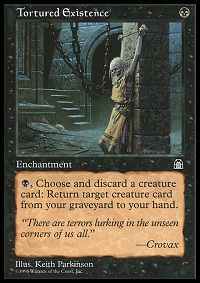 Let us take another example opponent, Tortured Existence. While not as popular as classic RUG Tron, Tortured Existence is a deck on the fringe that
you may run into. A hard counter on a creature sends it to the graveyard, a simple activation of Tortured Existence can get that creature back. It does
set the Tortured Existence player back on mana to cast the creature, as does any of the spells against Tron. Remand only sets them back, however not as much
as making them go through the effort of pulling the card back out of the graveyard before using it, however it does draw you a card which may get you the answer
you a looking for, perhaps a much desired Nihil Spellbomb, or Bojuka Bog, or a lightning bolt to seal a win. Memory Lapse puts it on top of their library
which makes them have to find a way to draw a card if they want to recast it that same turn. In most current Tortured Existence builds, outside of one built
with Tilling Treefolk and cycling lands, the Tortured Existence deck is more likely to get back a countered creature than they are one put on top with Memory Lapse.
In this situation Memory Lapse can be better than Remand or a hard counter.
Let us take another example opponent, Tortured Existence. While not as popular as classic RUG Tron, Tortured Existence is a deck on the fringe that
you may run into. A hard counter on a creature sends it to the graveyard, a simple activation of Tortured Existence can get that creature back. It does
set the Tortured Existence player back on mana to cast the creature, as does any of the spells against Tron. Remand only sets them back, however not as much
as making them go through the effort of pulling the card back out of the graveyard before using it, however it does draw you a card which may get you the answer
you a looking for, perhaps a much desired Nihil Spellbomb, or Bojuka Bog, or a lightning bolt to seal a win. Memory Lapse puts it on top of their library
which makes them have to find a way to draw a card if they want to recast it that same turn. In most current Tortured Existence builds, outside of one built
with Tilling Treefolk and cycling lands, the Tortured Existence deck is more likely to get back a countered creature than they are one put on top with Memory Lapse.
In this situation Memory Lapse can be better than Remand or a hard counter.
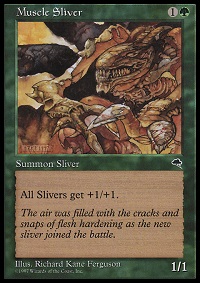 Now we tread onto the Slivers deck. Now the slivers deck is going to usually come out very fast, if it isn't destroyed by its own manabase that is.
They have 12 main lords, Muscle Sliver, Predatory Sliver, and Sinew Sliver. Now Sidewinding Sliver and Plated Sliver both have lord like qualitites but let's
focus on the fact that a Sliver decks threats are very consistent with all of the redundancy in the deck. The difference between hard countering one and casting
a Memory Lapse are not that different, though hard countering one still is better because they have no recursion. Remand is similar as it returns it to their hand, and
often the sliver mana base is one that is lackluster. Also even if they can recast the spell instantly, it still sets them back because Slivers want to deploy
as many threats they can a turn. Remanding a one mana spell versus a two mana spell here is huge due to the mana base and the ability to recast, as while Memory Lapsing a one mana spell isn't
as nearly as strong as it delays the spell regardless, though minus the card draw. A hard counter is best, Memory Lapse and Remand again fall into fuzzy territory though
I think Memory Lapse may edge it out but it is very unclear.
Now we tread onto the Slivers deck. Now the slivers deck is going to usually come out very fast, if it isn't destroyed by its own manabase that is.
They have 12 main lords, Muscle Sliver, Predatory Sliver, and Sinew Sliver. Now Sidewinding Sliver and Plated Sliver both have lord like qualitites but let's
focus on the fact that a Sliver decks threats are very consistent with all of the redundancy in the deck. The difference between hard countering one and casting
a Memory Lapse are not that different, though hard countering one still is better because they have no recursion. Remand is similar as it returns it to their hand, and
often the sliver mana base is one that is lackluster. Also even if they can recast the spell instantly, it still sets them back because Slivers want to deploy
as many threats they can a turn. Remanding a one mana spell versus a two mana spell here is huge due to the mana base and the ability to recast, as while Memory Lapsing a one mana spell isn't
as nearly as strong as it delays the spell regardless, though minus the card draw. A hard counter is best, Memory Lapse and Remand again fall into fuzzy territory though
I think Memory Lapse may edge it out but it is very unclear.
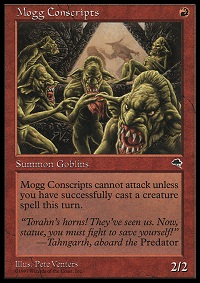 The last deck I want to talk about is Goblins. If a Goblin Cohort or Mogg Conscripts is on board, a hard counter is definately better as recasting a
goblin, whether sucuessful or not, still allows a Goblin Cohort or Mogg Conscripts to attack that turn and with the recasting probably even the next turn.
For all of the reasons stated earlier, hard counters seem to be just better than Memory Lapse and Remand. Why even play them?
The last deck I want to talk about is Goblins. If a Goblin Cohort or Mogg Conscripts is on board, a hard counter is definately better as recasting a
goblin, whether sucuessful or not, still allows a Goblin Cohort or Mogg Conscripts to attack that turn and with the recasting probably even the next turn.
For all of the reasons stated earlier, hard counters seem to be just better than Memory Lapse and Remand. Why even play them?
Hard vs Soft at what cost?
Soft counters such as Remand and Memory Lapse can be very good despite overall hard counters being better. It all depends on your deck and the situation you find yourself in. Counterspell is the best common counterspell, but how are you supposed to put that in a two color or more deck reliably? Then the question of what counter is right for you because a bit more complicated. What are you trying to do and what do you think most of the decks in the metagame are trying to do? What spell in your deck is the right spell against a specific deck?
Hard counters all have drawbacks essentially, based on what deck you are using. If you are a multicolored deck, counterspell may not be right for you. Even in mono blue, Deprive may set yourself back more than your opponent, especially if you really want to run Gush and/or Daze. Negate could miss a key creature, Remove Soul could miss a key burn spell. Prohibit can't counter a Fangreen Marauder that may win the game. It really depends on what you think you are likely to face, and what works all around. Memory Lapse and Remand can target essentially everything and fit into multicolored decks better, but lose the ability to permanently deal with a card. Though you could say any card short of an exile effect such as Faery Trickery don't permanently remove the card, yet that is true with any other type of removal.
Often I feel that with hard counters, you want to save it for that very specific spell. If it is only castable at sorcery speed, such as Fangreen Marauder, then you can fill your deck with other instant spells such as draw spells or other effects. However if you have to keep the mana up for an instant, you may be waiting with untapped mana for a while which could put you in a very bad position. You have to ask yourself every time an opponent casts a spell, is this spell worth countering?
With tempo counters, they are usually played a little differently. Often they are used on just about anything that costs more than one mana, just to set the opponent back but sometimes you do just need to stop that key spell. If I have a stronger board presence, I can Remand or Memory Lapse just about anything, to keep them off finding an answer. But in general, you usually want to hold onto your hard counters a little more for the key spells. With Remand you may just want the card draw and with Memory Lapse you may just need to stall so you can finish your opponent off.
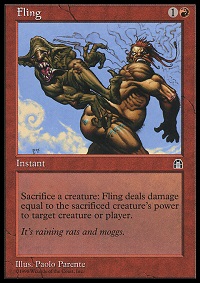 A final point where Memory Lapse and Remand exceed or equal a value of a hard counter are where spells that need to sacrifice or delve other cards.
Casting Memory Lapse or Remand on a Fling'd Atog is as effective essentially better than a hard counter. The reason is with Remand you get to draw a card,
and fling is put back in their hand, and Memory Lapse you make sure their next draw is a fling, which if their Atog is gone, is likely very less useful.
A card like Treasure Cruise loves to have cards in the graveyard. It can help decks that may run out of fuel to control, fill right back up. If you
tempo counter a spell, it doesn't go to the graveyard, which doesn't help fuel Treasure Cruise. I have had situations against control decks
where I have 6 cards in the graveyard and know they have a counter and only can cast one counter. I baith with a spell that they counter, then now have
7 cards in the yard and can cruise for a single blue mana. While that doesn't come up that often, what can happen more often is actually tempo countering
the Treasure Cruise. You essentially make the cards that they removed for the cruise useless, and often strand a Treasure Cruise on top of their deck or
in their hand as they usually can't cast it again right away.
A final point where Memory Lapse and Remand exceed or equal a value of a hard counter are where spells that need to sacrifice or delve other cards.
Casting Memory Lapse or Remand on a Fling'd Atog is as effective essentially better than a hard counter. The reason is with Remand you get to draw a card,
and fling is put back in their hand, and Memory Lapse you make sure their next draw is a fling, which if their Atog is gone, is likely very less useful.
A card like Treasure Cruise loves to have cards in the graveyard. It can help decks that may run out of fuel to control, fill right back up. If you
tempo counter a spell, it doesn't go to the graveyard, which doesn't help fuel Treasure Cruise. I have had situations against control decks
where I have 6 cards in the graveyard and know they have a counter and only can cast one counter. I baith with a spell that they counter, then now have
7 cards in the yard and can cruise for a single blue mana. While that doesn't come up that often, what can happen more often is actually tempo countering
the Treasure Cruise. You essentially make the cards that they removed for the cruise useless, and often strand a Treasure Cruise on top of their deck or
in their hand as they usually can't cast it again right away.
Strictly Better
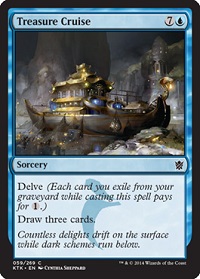 I don't like the term strictly better in general but sometimes it can be applied in magic. A vanilla 2/2 vs a 2/2 with an ability for the same mana cost
may be a no brainer, but when dealing with counterspells, especially things that are so situational due to the vast differences have much more of a grey area
that you have to consider when building your deck. Make every decision count in a deck. I honestly like a variety of spells. I am not afraid to run a single
copy of four different types of counter spells rather than a single playset of one if it seems appropriate for the meta. This goes with removal in general.
That way if you find a matchup that X spell is bad, you aren't running 4 of that X spell, and instead only have to side out one spell instead of all four.
I don't like the term strictly better in general but sometimes it can be applied in magic. A vanilla 2/2 vs a 2/2 with an ability for the same mana cost
may be a no brainer, but when dealing with counterspells, especially things that are so situational due to the vast differences have much more of a grey area
that you have to consider when building your deck. Make every decision count in a deck. I honestly like a variety of spells. I am not afraid to run a single
copy of four different types of counter spells rather than a single playset of one if it seems appropriate for the meta. This goes with removal in general.
That way if you find a matchup that X spell is bad, you aren't running 4 of that X spell, and instead only have to side out one spell instead of all four.
About the Author
PauperTim is this websites owner and has always been into games of all sorts. He is a founder of the Pauper format for Magic: The Gathering. You can find him on facebook, twitter or OCTGN as PauperTim or as TheOrangeMitten on Magic Online.